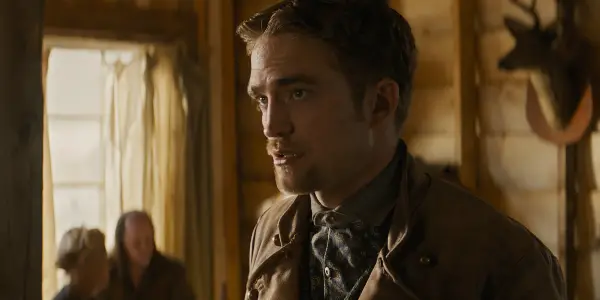Has the Western reached a point now where it’s impossible to avoid parodying it? How long has it been that way? That seems to be one of the questions on the mind of directors David and Nathan Zellner (who also star in the film) in their unfocused and altogether unsatisfying take on the genre. Or, at least, the film begins with that question: two dusty stretches of sand and dirt road open up the screen, and caught in its middle are a pair of bedraggled strangers.
At first, their conversation is a pointed jab at the defeatist tone of No Country for Old Men and Hell or High Water, each subversive Westerns in their own right that lamented the bygone eras of good ‘ol gun-slinging values. One stranger mourns the death of his wife. The other assures him that it won’t get better. The first then retorts that he’s moving on with his life and starting afresh, in bland and bored register. In short: we’ve seen this all before, and Damsel amps that fact up to breaking point.
But, suddenly, the second stranger loses his patience, strips near-naked and runs off into the vast nowhere of the red landscape. This is the new direction of the genre, the Zellner brothers claim: one entrenched with farce, whimsy and a flippant attitude towards the grit of the modern Western. Their approach is admirable and considerably original, but ultimately a failure.
Pattinson And A Pony
Despite its threadbare relevance to the meat of Damsel’s narrative, the scene is perhaps the film’s greatest, establishing its off-kilter tone while landing the comedy. What follows is a first half that’s engaging if unambitious, and a second half that’s plodding and… yup, still unambitious.

It begins with Pattinson and a pony. His character, a slightly-unhinged pioneer called Samuel Alabaster, sets off across the Wild West along with pathetic pastor-in-training Parson Henry (played by director David Zellner). Their mission is to rescue Pattinson’s fiancé, Penelope (Mia Wasikowska), from the evil clutches of kidnapper Anton Cornell. Their artillery is a couple of guns and a guitar that twonks on just about anything. And their miniature horse, well, that’s Penelope’s wedding gift (its name is Butterscotch, by the way).
Of course, not everything goes to plan. Yet for this first stretch of Damsel, it plays out as a tentative parody that often succumbs to its Western tropes. The humor ranges from downright hilarious (a campfire sing-a-long is brilliantly written, with Pattinson able to flaunt his comedic timing) to downright baffling (an early scene in a bar that involves whisky and Adam Apples is hardly funny and plays out to tedium, but at least contributes to Damsel’s commitment to its eccentric tone). Pattinson here is fantastic throughout, a soppy and sentimental wannabe cowboy just looking for his love.
Wasikowska And A Waste
Except his love may not love him back. Damsel’s second half takes a bold turn that musters up a fascinating narrative whiplash; a shame then, that by this point it’s essentially run out of ideas. As its title alludes to, this Zellner brothers’ film is concerned with the ‘damsel in distress’, or, more specifically, in picking that convention apart.
The point is made at the halfway mark – the Western ideal of a man looking for his lost love, who barely registers as a character, is hardly worth embellishing in this day and age. There’s a couple of problems with this: that what follows is a bloated and directionless patchwork of events that only serve to reiterate this point, and that the ‘lost love’ still barely registers as a character.
For now the Zellner brothers have taken the damsel’s role to the other extreme: Mia Wasikowska is tough, and doesn’t have the time to deal with the men that pitifully lust after her, sure, but there surely needs to be more substance to her character than that. Damsel is essentially a spruced-up Let The Sun Shine In set in the outback, if Claire Denis’ film had neglected to contextualise its protagonist.
It doesn’t help that for all of Wasikowska’s hard work in salvaging her underwritten character, her accent is a wobbly brew of American-Australian that often bursts into bouts of Irish. She’s not a damsel in distress; the only thing distressing about her is how much of a non-entity she is. As she meanders through the second half of Damsel (and we are forced to meander along with her), the film’s sense of humor becomes more spotty and less rich, its wry observations and clumsy farce barely worth a chuckle.
Heck, even Butterscotch is given short shrift, a one-time gag and stallion-contrasting prop that’s about as useless and uninteresting as any other character that inhabits Damsel’s version of the Wild West (well, save for Pattinson).
Conclusion: Damsel
Ultimately, Damsel fails to maintain the breezy dysfunctional charm that its first half establishes (one that is not dissimilar to another Western oddity, Slow West). Pattinson is committed, a goofy screw-loose role proving his range, but the film’s stabs at satire fold back on itself, and its humor is desperately first-draft-ish.
If this is David and Nathan Zellner’s case for the new direction of the subverted Western, then it’s one likely to be swept under the rug, no matter how commendable their intentions may be. That near-naked stranger is still running into the vast nowhere of Damsel’s red landscape, but no-one’s there to acknowledge him.
Do you think there’s any more room for Western originality? Has the genre reached the point where it’s unable to avoid being parodied? Let us know your thoughts in the comments below!
Damsel has no US and UK release dates yet. For all international release dates, see here.
Does content like this matter to you?
Become a Member and support film journalism. Unlock access to all of Film Inquiry`s great articles. Join a community of like-minded readers who are passionate about cinema - get access to our private members Network, give back to independent filmmakers, and more.